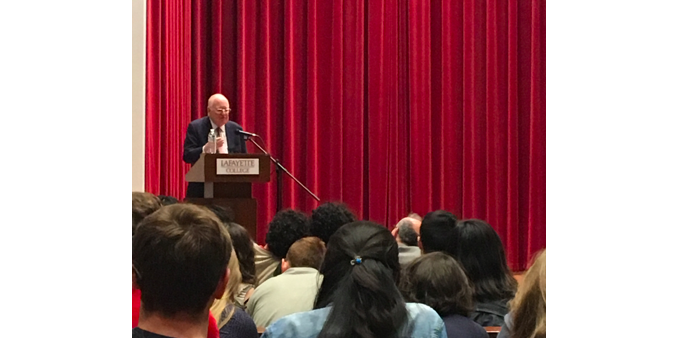Provost of Columbia University and foreign policy expert John Coatsworth came to Lafayette to speak about President Donald Trump’s foreign policy, but he and several audience members walked into the lecture wondering whether there was even something to talk about.
“It didn’t occur to me that Trump would not have a foreign policy to talk about three months into his presidency,” Coatsworth joked. “Trump’s foreign policy announcements, tweets and comments have no coherence or logic.”
He said that Trump is attempting to hold two contradictory foreign policies at the same time, confrontational neoconservative attitudes against enemies like Russia and “America First” isolationism.
In a world where the United States faces their own power declining and nations like China are on the rise, neither neoconservatism nor isolationism holds the answer, he said.
“The neo-con answer is to maintain and expand America’s dominance for as long as possible,” he said. “The isolationist answer is to turn inward and reduce commitments.”
“In my view, the more difficult but ultimately smarter strategy will be to deploy American power to strengthen international institutions and regulatory institutions” so that they become beneficial to rising power nations like China and declining nations like the US, Coatsworth said.
“If you’re going to make the future of the country conditional on dominating every other country in the world, you’re going to run out of steam,” he said of the neoconservative values.
International affairs professor Caleb Gallemore wrote in an email that he thought Coatsworth did an “excellent job” of discussing the Trump administration’s foreign policy which has been “a moving target to the point it seems difficult to say for sure if such a policy exists.”
He also wrote that he agreed with Coatsworth that the “liberal institutionalist approach” was best for America’s future.
Barker Carlock ’17 posed a question to Coatsworth about the nation’s future with North Korea.
“How do you see our administration moving forward with the [neoconservative] approach toward North Korea and affecting our relationship with them?” Carlock asked.
With the administration’s policy still not entirely clear on this, Coatsworth said, the neo-con policy would be to shoot a missile down if fired and, if the government believes that their missiles could hit US soil, “we bomb the hell out of them.” Another approach would be to work with China to dismantle North Korea.
Adam Valavanis ’17 asked Coatsworth whether it was morally wrong to wait and see what Russia was going to do next in the world without stepping in.
Coatsworth replied that since Russia does not pose a threat to America or its allies, it is not in the American best interest to step in, and that Russia should be left to its own devices.
Valvanis said he disagreed with Coatsworth’s assessment.
“They’re working out their problems in other countries, and that just seems wrong,” he said. “Seizing Ukraine is flying in the face of any institutionalism that’s been built throughout the world.”
President Alison Byerly said she found student questions intriguing and that she though Coatsworth did a wonderful job.
“It was an interesting exposition that inquired a wide range of topics. I was glad to see there was a wide student turnout,” she said. “In talking to Provost Coatsworth afterwards, he was very impressed by the caliber of student comments.”
Byerly added that she thought Coatsworth handled the very fluid and ever-changing topic of Trump’s foreign policy very well.





















































































































